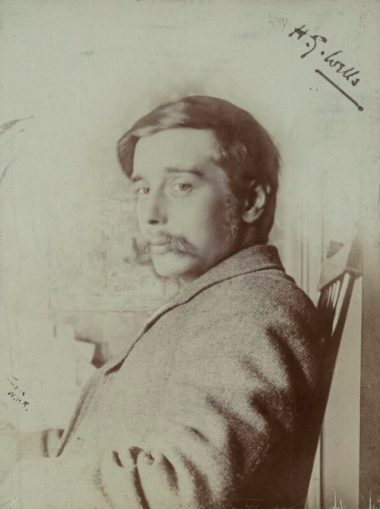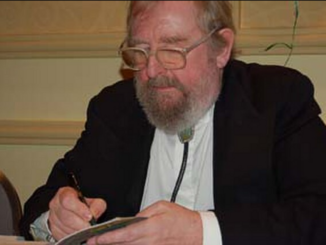
Mayall & Newman Ltd, Public domain, via Wikimedia Commons
I’m sure many people are familiar with H.G. Wells’ science fiction output, with novels like The War of the Worlds, The Shape of Things to Come, The Invisible Man, The Sleeper Awakes (which some have seen as a precursor to 1984), The Time Machine and The First Men in the Moon (which we were once set at school – not for an exam, but just to read; I found it an uninspiring slog, but maybe that says more about fourteen year old girls’ tastes than it does about H.G. Wells) and their seemingly endless spin-offs in terms of films, tv series and even musicals. His well-known works divide roughly into two categories – the sci fi we have already mentioned, and lighter, almost comic works of social comment, like The History of Mr Polly (the tale of a timid draper whose suicide attempt wins him a large insurance pay-out) and Kipps (an illegitimate orphan saved by an unexpected large inheritance). Kipps was the basis of the hugely successful 1960s West End Production Half A Sixpence, starring Tommy Steele. Immediately it is obvious that there is a large element of wish-fulfilment about these popular works, and it is this – the dreamier side of Wells – that I want to emphasise here, especially in relation to his politics.
Tomalin, in writing about H.G’s formative life (which she defines as up to the age of forty), draws heavily on his own autobiography but has also gained access to some lesser-known letters from Wells to a teenage mistress, Amber Reeves, which are quite revealing re his self-centred nature, where idealism (Wells believed – or said he did – in a world where free love would reign) butted up against pragmatism: having seduced teenage student Amber – or she having followed his path of the ‘emancipated young woman’, you could say – Wells then decided he could not leave his wife after all. Amber then asked Wells to ‘at least give her a baby’, which he condescended to do before dumping her in an ever-so-caring way. The rift this caused (the Reeveses were family friends, and took a dim view of his conduct) was never healed.
In a way, this relationship seems a bit like a microcosm of the way Wells operated on a larger scale. (Another incident, where he went on holiday to a French villa with Reeves, then called for his second wife and children to join them when her company – and housekeeping – proved less than congenial, springs to mind). Having spent six years wooing his first wife (a cousin), he abandoned her when their honeymoon sex proved disappointing. Tomalin is clearly in thrall to this ‘attractive’ genius, but I’m afraid it is all too easy to see him as simply an unpleasantly selfish man who, in dreaming his idealistic dreams, wreaked havoc on those around him. “Didn’t I have Isabel because I wanted her and chucked her because I wanted to and have Jane? I never gave up anything I wanted (and I ain’t going to do so now)”, he once wrote.
The same could be said of his politics, which ballooned from the kind of small-scale, co-operative socialism fashionable among people like William Morris and the Arts and Crafts set to Utopian schemes for the future of all humankind. Wells proudly proclaimed himself to be an “extensive skeptic” having “no God, no King, no nationality”. His 1901 book Anticipations was, he said, “designed to undermine and destroy the monarch, monogamy and respectability – and the British Empire, all under the guise of a speculation about motor cars and electric heating”. While these views from a late Victorian/early Edwardian must have seemed dashing, daring and even inspiring at the time, it is hard not to judge them nowadays without framing them through the events of the twentieth century, when many of these communitarian-type ideas have not only been tried and found wanting but have actually cost millions of lives. Destruction, it would appear, is the easy part; rebuilding, not so much.
Wells predicted – and indeed shaped – many aspects of our current world: Woy Jenkins’ permissive society, aerial bombardment of civilians, lasers, tanks, genetic engineering, the atomic bomb. What comes through is how astonishingly modern he was. He foresaw a fair world whose ills could all be removed by reliance on science, where all should be equal, under something very like our current UN Universal Declaration of Human Rights; a ‘United States of the World’ where peace would be assured by a highly regulated system where all property would be owned by the state, where sexes would be equal but a hierarchy would exist of ‘classes of mind’, ruled in the interests of all by an unelected Samurai-like elite. An earlier biographer, Michael Sherbourne, called this ‘an undemocratic one-party state in which truth is established not by critical discussion but by shared faith’. Wells believed that what could be described as a sort of benevolent authoritarianism was needed in order to assure world peace. Even the Fabians – he was an active member – lost patience with him in the end (or he with them). One cannot escape the idea that Wells, by and large, saw humans as pieces on a chessboard, with himself – naturally – as the grand master.
The book is a shortish one, available in paperback (or, in my case, through the library) and a good read. I felt it was perhaps slightly below par for Clare Tomalin, but then she is so good that anything a bit under her normal standard is still streets ahead of most biographers, imo. Wells was undoubtedly a man of huge charisma and prolific output, an original thinker with a brilliant imagination – a sickly child, born into straitened circumstances and not expected to live, who somehow grew up to create wealth and riches simply from his own mind and hard work and moved in the highest circles. One follower, William Beveridge (who perhaps did more than anyone to bring about the post-war welfare state), called him “a volcano in perpetual eruption of burning thoughts and luminous images’. Churchill, who was also an admirer, put Wells’ writing under two different sub-heads: the ‘jam’ (Wells’ popular fiction) and the ‘suet’ (his works on the more serious topics), saying he preferred the former. I’m inclined to agree. As to his vision of the future, thanks but no thanks.
Featured image: Henrique Alvim Corrêa, Public domain, via Wikimedia Commons
Link to book on Amazon for the adblockers: The Young H.G. Wells: Changing the World
© foxoles 2023



